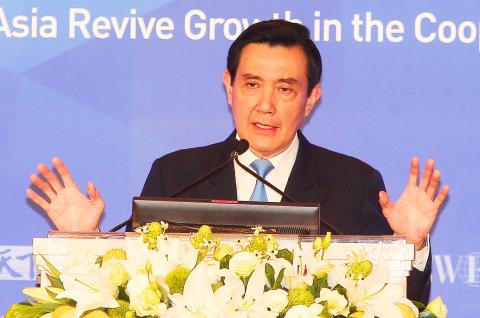President Ma Ying-jeou (馬英九) yesterday said that the word “caretaker” was not in his dictionary, brushing aside calls to leave important decisions to a new administration, while promising to forge ahead on several regional trade agreements.
Following the elections on Saturday last week, which saw the Democratic Progressive Party (DPP) win the presidency and legislature in a landslide, DPP officials have called for Ma’s administration to serve as a caretaker government, deferring important decisions to president-elect Tsai Ing-wen (蔡英文).
However, at an economic forum on Asian economic growth at the Grand Hyatt Taipei, Ma said that reviving economic growth and dealing with the slump in exports that followed the European debt crisis were global problems, while finding a new competitive edge for the economy was the inescapable responsibility of any Taiwanese leader.

Photo: CNA
At a time when the functionality of the WTO is declining and other nations are continually signing bilateral trade deals, Taiwan must follow the trend of the global economy, he said.
Economic integration is a new thing for Asia, he said, citing the conclusion of Trans-Pacific Partnership and Regional Comprehensive Economic Partnership negotiations, along with the establishment of the ASEAN Economic Community last month.
While Taiwan wants to participate in each of these agreements, accession is difficult not only economically, but also for many political reasons, he said, promising to continue pushing for the nation to be included over the remainder of his term.
“It is I ‘still’ have four months, not I ‘only’ have four months,” he said, referring to his term’s expiration on May 20.
“My dictionary does not have the words ‘caretaker’ or ‘slacker,’ in it,” he added.
Ma said that a peaceful political environment was a necessary condition of market stability, adding that no one should “rule out” deals with China because such a policy would be not only mistaken, but also potentially fatal for Taiwan.
The president said a peaceful environment was also a precondition for economic growth, adding that the so-called “1992 consensus” had served to make both sides of the Taiwan Strait peaceful and prosperous over the past eight years, a period that saw Taiwan achieve the warmest possible relations with both the US and China.
Cross-strait peace was hard-won and people should learn to treasure and work hard to preserve it, he said, in an apparent jab at Tsai.
The “1992 consensus” refers to a supposed tacit understanding between Chinese Nationalist Party (KMT) and the Chinese Communist Party that there is “one China,” but both sides have different interpretations of what “China” means.
Additional reporting by Abraham Gerber

The CIA has a message for Chinese government officials worried about their place in Chinese President Xi Jinping’s (習近平) government: Come work with us. The agency released two Mandarin-language videos on social media on Thursday inviting disgruntled officials to contact the CIA. The recruitment videos posted on YouTube and X racked up more than 5 million views combined in their first day. The outreach comes as CIA Director John Ratcliffe has vowed to boost the agency’s use of intelligence from human sources and its focus on China, which has recently targeted US officials with its own espionage operations. The videos are “aimed at

STEADFAST FRIEND: The bills encourage increased Taiwan-US engagement and address China’s distortion of UN Resolution 2758 to isolate Taiwan internationally The Presidential Office yesterday thanked the US House of Representatives for unanimously passing two Taiwan-related bills highlighting its solid support for Taiwan’s democracy and global participation, and for deepening bilateral relations. One of the bills, the Taiwan Assurance Implementation Act, requires the US Department of State to periodically review its guidelines for engagement with Taiwan, and report to the US Congress on the guidelines and plans to lift self-imposed limitations on US-Taiwan engagement. The other bill is the Taiwan International Solidarity Act, which clarifies that UN Resolution 2758 does not address the issue of the representation of Taiwan or its people in

US Indo-Pacific Commander Admiral Samuel Paparo on Friday expressed concern over the rate at which China is diversifying its military exercises, the Financial Times (FT) reported on Saturday. “The rates of change on the depth and breadth of their exercises is the one non-linear effect that I’ve seen in the last year that wakes me up at night or keeps me up at night,” Paparo was quoted by FT as saying while attending the annual Sedona Forum at the McCain Institute in Arizona. Paparo also expressed concern over the speed with which China was expanding its military. While the US

SHIFT: Taiwan’s better-than-expected first-quarter GDP and signs of weakness in the US have driven global capital back to emerging markets, the central bank head said The central bank yesterday blamed market speculation for the steep rise in the local currency, and urged exporters and financial institutions to stay calm and stop panic sell-offs to avoid hurting their own profitability. The nation’s top monetary policymaker said that it would step in, if necessary, to maintain order and stability in the foreign exchange market. The remarks came as the NT dollar yesterday closed up NT$0.919 to NT$30.145 against the US dollar in Taipei trading, after rising as high as NT$29.59 in intraday trading. The local currency has surged 5.85 percent against the greenback over the past two sessions, central